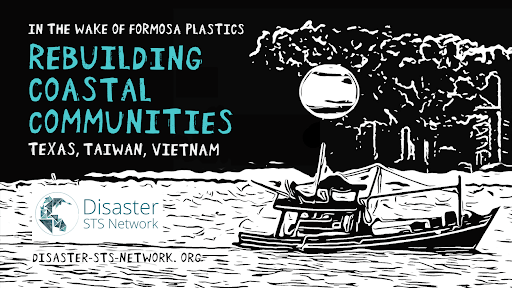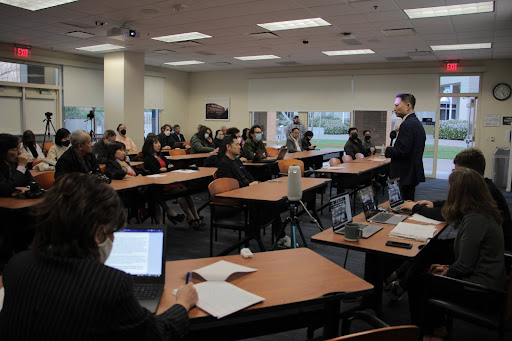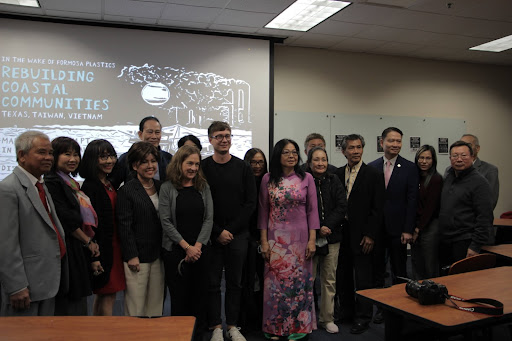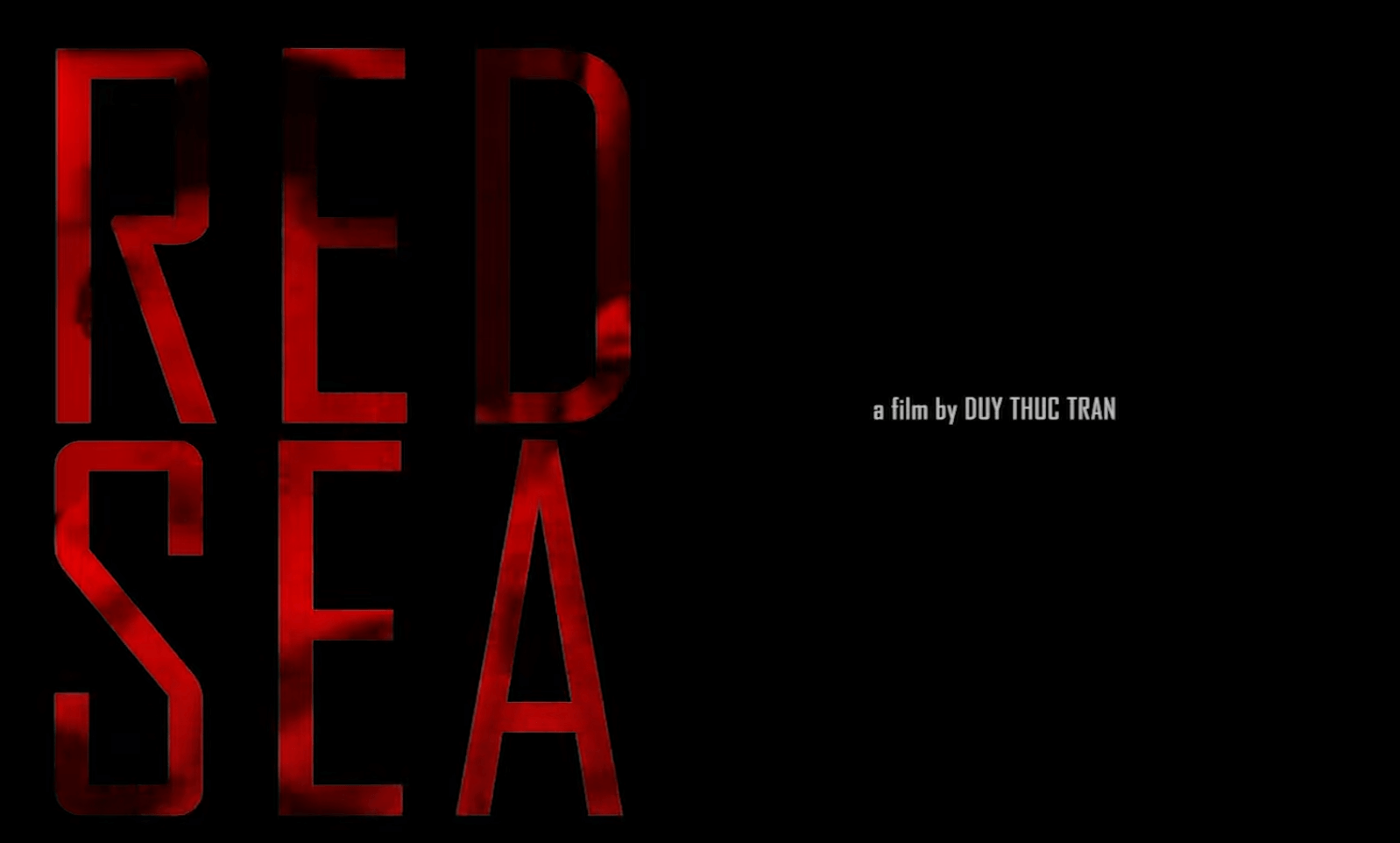In the Wake of Formosa Plastics: A Report from the Reaching For Just Transition Seminar Series
Tim Schütz and Kim FortunJune 6, 2022 | Report-Backs
The cascading and interlaced effects of COVID-19, climate change, systemic racism, and dramatic inequity within and between countries are now in high relief. The Reaching for Just Transition Seminar Series, organized by the EcoGov Lab at the University of California, Irvine, brings people together to build understanding of the problems that need to be addressed, to develop ways of thinking and speaking about related injustices, and to strategize what needs to be done going forward.
Labor organizers began speaking in terms of just transition in the 1980s, reaching for ways around claims that people had to choose between good jobs and environmental protection. Today, there is accelerating recognition that investment in both environmental protection and new ways of organizing the economy will be critical to inclusive prosperity. Renewed calls for just transition speak to this.

Fig. 1. Banner for the Formosa Plastics event. Visual by Tim Schütz, March 2022.
On March 3, 2022, we launched our series with a public seminar focused on the Formosa Plastics Corporation. Formosa is a global petrochemical company that operates plants in coastal communities in Taiwan, Vietnam, and the United States (Fig. 1). Across settings, Formosa is known as a serial offender of human and environmental rights, ranging from frequent explosions to air pollution and routine discharge of plastic waste into local waterways.
Our interest in Formosa first developed through a collaborative “field campus” in Cancer Alley and collaborations with STS researchers Wen-Ling Tu and Paul Jobin, who have studied air pollution around Formosa’s Sixth Naphtha Cracker Complex. Since 2020, we have also collaborated with activists to build the digital Formosa Plastics Global Archive, hosted on the Disaster-STS Research Network.
Importantly, Formosa’s reach extends beyond plastics. In 2016, toxic discharges from a Formosa-owned steel plant in Vietnam caused a massive fish kill, polluting over 150 miles of coastline and devastating local fisheries. A lack of government accountability was met with countrywide mass protests, followed by the arrest of several environmental activists and critical journalists. In response, a transnational environmental justice network, led in part by Catholic priests, is calling for the release of imprisoned activists and for adequate compensation of victims. More recently, after several attempts to take legal action in Vietnam, a group of 7,800 plaintiffs launched a civil lawsuit against Formosa in Taiwan’s supreme court.
In the Wake of Formosa Plastics
For the hybrid March 3rd event (see recording here and report in Vietnamese), we collaborated with Nancy Bui, a Texas-based filmmaker and co-founder of the organization Justice for Formosa Victims (JfFV). Together, we invited activists and researchers who have spent years working to address Formosa’s harms in different ways. Panelists included sociologist Paul Jobin, Catholic priest Father Peter Nguyen Van Hung, and lawyer Philippe LaRochelle who have been involved in the lawsuit against Formosa Steel in Vietnam.
We also invited Gary Watson, a member of RISE St. James, a faith-based activist group that is campaigning against the construction of a new $12 billion Formosa plant in Louisiana’s “Cancer Alley” a corridor between New Orleans and Baton Rouge with over 150 petrochemical plants and refineries; and Diane Wilson, a fourth generation fisherwoman who recently led a clean water citizen suit against Formosa in Texas, resulting in a historic legal settlement and efforts to revitalize local fisheries.
The event was opened by Tri Tra, Mayor of the nearby City of Westminster, California (Fig. 2). In Orange County, the city is known as the heart of “Little Saigon”, one of the largest Vietnamese diaspora communities. In his remarks, Tra recalled that the Formosa disaster affected many Vietnamese Americans and their families abroad.

Fig. 2. Mayor Tri Ta opening the Just Transition Seminar. Photo by Prerna Srigyan, March 2022.
Drawing from his joint work with legal advocates in Taiwan and Vietnam, Canadian lawyer Phillipe Larochelle opened the discussion with an overview of the many intersecting forms of environmental injustice at play within the Formosa Steel disaster. According to Larochelle, the lack of legal accountability in Vietnam is exacerbated by the government’s decision to actively withhold details about the quality and quantity of the toxins released. Independent investigations by researchers and non-governmental organizations, Larochelle noted, are further limited by Formosa’s opaque corporate structure, with offshore accounts in the Cayman Islands. Larochelle highlighted the need for response from the international community,
Father Peter Nguyen Van Hung, a Vietnamese Catholic priest, then provided further insights about the social and economic impact of the marine disaster. Living in Taiwan, Van Hung has a long history of working with Vietnamese immigrants, including several fishermen from the affected provinces. Following the disaster, Ngyuen Van Hung organized a series of public protests in Taipei, drawing in other Catholic groups to address the failed efforts by the government to support immigrants who were forced to leave Vietnam.
Building on field research in both Vietnam’s coastal regions and fenceline communities in Taiwan, sociologist Paul Jobin elaborated on the different violations and harms related to Formosa’s increased industrial activity. Jobin argued that the Formosa Vietnam disaster already began before the toxic spill, since the construction of the steel plant led to land grabs and devastation of the local communities. Jobin also drew on research in Yunlin County, Taiwan, where a large Formosa petrochemical complex has continued to pollute the air and waters of nearby oyster farms. Despite an ongoing toxic tort lawsuit led by affected families in the region, Jobin pointed out that the company uses aggressive greenwashing and intimidation to divert attention from its disastrous impact on the community.

Fig. 3. In-person panelists and participants at the Just Transition seminar. Photo by Prerna Srigyan, March 3, 2022.
Panelist Gary Watson then expanded the focus to activist campaigns against Formosa’s expansion on the US Gulf Coast. Watson, a media business consultant who grew up in Louisiana’s River Parishes, remembered Formosa’s earliest appearance in the region when he was still a child. In the 1990s, Formosa had plans to build a rayon factory on a former sugar plantation, involving an industrial rezoning scandal in the historically Black community of Wallace. Watson’s memory of Black residents being forcibly removed from a council hearing about the plant’s construction served as a sobering backdrop for current struggles against Formosa’s expansion in Louisiana. While the coalition led by RISE St. James has achieved an indefinite suspension of Formosa’s permits, activists have faced intimidation tactics by the company and police. Construction of the plant is driven by a boom in oil and shale gas, and its operation is expected to further contribute to climate change.
Finally, Texas-based shrimp fisherwoman Diane Wilson reflected on her thirty years of activism against Formosa. Following the release of US toxic release inventory data in the 1980s, Wilson became aware of industrial pollution in her home community of Seadrift, Texas. While Diane has led many lawsuits against Formosa, the most recent one is especially notable. Over the last four years, Diane and a group of ex-plant workers monitored plastic pollution outside Formosa’s Point Comfort facility. Their collection of thousands of bags of plastic pellets (so called “nurdles”) and leaked documentation resulted in a $50 million legal settlement with Formosa. Importantly, more than half of the funds will be used to develop a fishing cooperative to support the majority Hispanic and Vietnamese fishing community.
Archiving Formosa Vietnam
We concluded the meeting with a preview of RED SEA: Vietnam’s Modern Disaster, a documentary produced by JfFV co-founder Nancy Bui (Fig. 4). Since 2021 we have been working with Bui as assistant co-producer (Tim Schütz) and educational advisor (Kim Fortun) for the film. Our goal is to draw out parallels to the 1984 Bhopal Disaster and to develop curricular material to support use of the documentary in diverse environmental justice teaching settings. Footage and related material from Bui’s Red Sea project will be preserved in the Formosa Plastics Global Archive, becoming publicly accessible after the film’s release in 2023.
The Formosa Plastics Global Archive now includes over 700 items, organized into both place-focused and thematic collections. There are collections focused on many different Formosa communities, each with content unique to the history of work in that place to characterize and respond to Formosa’s environmental harms. There are also collections focused on themes that cross-cut the place-focused collections. In each place-based collection, for example, we are building records of “data divergence” – denoting where and how different claims about environmental harms have been articulated and conveyed – building a record of the many ways that greenwashing, erasure and other forms of disinformation are the context of environmental governance today.
If you have ideas for future seminars, contact the EcoGov lab at kfortun@uci.edu.
__________________________________________________________________
Tim Schütz is a PhD student in the University of California Irvine’s Department of Anthropology. His research and teaching focuses on ways that data are mobilized across scientific fields, as evidence in legal cases, and as shared points of reference in social movements. He co-develops a series of ongoing collaborative research projects, including Quotidian Anthropocenes, Visualizing Toxics, and the Formosa Plastics Global Archive.
Kim Fortun is a Professor in the University of California Irvine’s Department of Anthropology. Her research and teaching focus on environmental risk and disaster, data practices and politics, and experimental ethnographic methods and research design. Fortun has played a lead role in the design of the Platform for Experimental and Collaborative Ethnography (PECE), which provides digital workspace for an array of collaborative projects, including the Formosa Plastics Global Archive and related Environmental Justice Global Record Project.
Published: 06/06/2022

